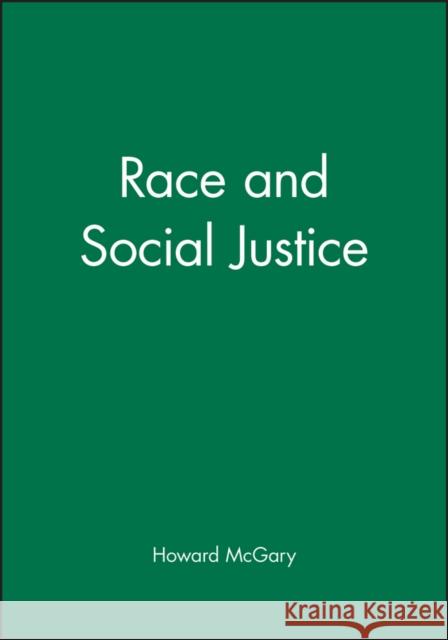Race and Social Justice » książka



Race and Social Justice
ISBN-13: 9780631207214 / Angielski / Miękka / 1999 / 256 str.
Race and Social Justice
ISBN-13: 9780631207214 / Angielski / Miękka / 1999 / 256 str.
(netto: 201,06 VAT: 5%)
Najniższa cena z 30 dni: 208,54
ok. 30 dni roboczych.
Darmowa dostawa!
Written by one of America's leading philosophers, Race and Social Justice provides a powerful analysis of the enduring problems of race and social justice in American life.
"Calling the collection ′a model of informed and informing civil discourse at its best that invites us to join in like fashion,′ noted philosopher Lucius Outlaw of Haverford College praises McGary as ′a journeyman scholar–teacher respected for (his) passionate engaging of some of the most challenging of the issues of contemporary social, political, and moral life.′"
Lori Chambers, Rutgers Magazine
"The care with which he [McGary] presents the issues and the relevant arguments makes this an inviting text for undergraduate as well as graduate courses." Ethics, vol. 3, July 2001.
"Blackwell has done a service to social philosophy and African–American philosophy by bringing this collection of important essays to print. Addressing problems of racism and the search for social justice in liberal political thought, they provide crucial insights that will revive the often politically bankrupt discipline of political philosophy by highlighting dimensions of it that are most relevant to problems of our day." Lewis Gordon, Brown University and the University of the West Indies, at Mona, Jamaica, Author of Her Majesty Other Children
"Reed Howard McGary s essays in this book and you will experience insightful discussion of issues of justice that will likely challenge you by their compelling importance as well as by the model of clarity, patience, thoughtfulness, and principled moderation of passion that he invests in his discussions. Here is a model of informed and informing civil discourse at its best invites us to join in like fashion." Lucius Outlaw, Haverford College
Preface.
Acknowledgments.
Introduction.
Part I: The Problem of Racism:.
1. Alienation and the African–American Experience.
2. Race and Class Exploitation.
3. Racial Integration and Racial Separatism: Conceptual Clarifications.
4. The African–American Underclass and the Question of Values.
Part II: The Response to Racism:.
5. Morality and Collective Liability.
6. Justice and Reparations.
7. Reparations, Self–Respect, and Public Policy.
8. Affirmative Action: A Review and Commentary.
Part III: Racism and its Remedies:.
9. The Race and IQ Controversy.
10. Police Discretion and Discrimination.
11. DuBois, the new Conservatism, and the Critique of African–American Leadership.
12. Racism, Social Justice, and Interracial Coalitions.
Bibliography.
Index.
Howard McGary is Professor of Philosophy at Rutgers, the State University of New Jersey. He has published numerous articles on questions of distributive justice and philosophical issues raised by racism. He is the co–author of Between Slavery and Freedom: Philosophy and American Slavery (1992) and he serves on the editorial boards of the Philosophical Forum, Encyclopedia of Ethics, and Social Identities.
Written by one of America′s leading philosophers,
Race and Social Justice provides a powerful analysis of the enduring problems of race and social justice in American life. McGary examines African American alienation and exploitations, black reparations, collective responsibility, affirmative action, race and I. Q., police discretion, racial integration and racial separatism, the underclass question, and the logic of interracial coalitions. The volume is marked by its interdisciplinary approach, depending on work in African American history and literature as well as recent work by legal scholars, political scientists, and sociologists who have wrestled with race and racism.
African American philosophers have challenged the position that the African American experience cannot serve as a source of philosophical illumination. Philosophers like Anthony Appiah, Bernard Boxill, Bill Lawson, Michele Moody–Adams, Adrian Piper, and Laurence Thomas have employed traditional analytical methods in their examinations, while others like Leonard Harris, Lewis Gordon, Frank Kirkland, Lucius Outlaw, Cornel West, and Naomi Zack have embraced methodologies that are more characteristic of the Continental and Post Modern methodologies. These authors, each in their own way, have started a dialoge that has now worked its way into the pages of academic journals and onto the programs of philosophy conferences and meetings. Race and Social Justice joins and extends these discussions, providing essential reading for anyone with an interest in this field of debate and study.
1997-2026 DolnySlask.com Agencja Internetowa
KrainaKsiazek.PL - Księgarnia Internetowa









